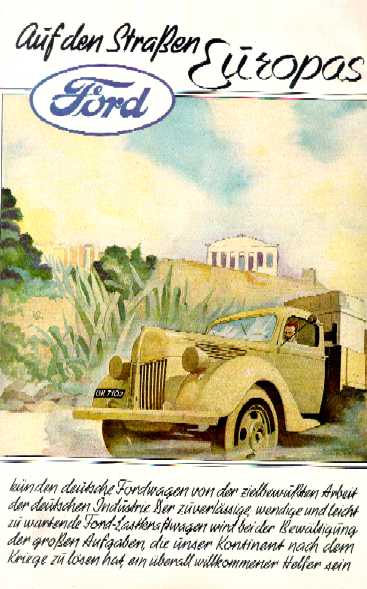|
|
|
Fascism in America: The early days.
The pictures we are given of fascism and its nazi
derivative are those bleak black and white views of the rail road
tracks leading through the razor-wire gates of Dachau and
Buchenwald. We see the iron rows of Panzer tanks on parade;
watching old propaganda footage we cringe as we hear the
screaming dive of Stukas as they pound their pitiful
targets---and we are missing something beyond the stealth of das
u-boote, beyond the pounding march of a nation armed to the teeth
- We are forgetting the money that financed the steel and
explosive and we are forgetting those men of means who made it
all possible.
Some of those men who helped build Hitler's horror were American.
Prominent among those men was Henry Ford who provided factories
and his anti-Semitic publication, "The International Jew." Hitler was so taken by Ford's work that he
incorporated much of it in his Mein Kamf. Henry Ford became
enamored of the fascists when he saw how Mussolini and Hitler
were able to crush and emasculate the trade unions. The shared
anti-labor anti-Semitism coupled with the industrial zeal of an
arming nation attracted Ford to the Nazis Ford then used his
personal prestige and corporate publications to spread nazi
propaganda. Ford's work in furthering fascism earned him the
highest civilian award (Click here to see 1938 A.P.photo of Nazis giving Ford his medal) from the Nazis (Charles Lindbergh
also earned this dubious medal). Men like these saw fascism as the
savior of society against communism.

1944 German ad for Ford trucks
Behind those with the machinery and the ideas of
industry were men like George Herbert Walker and his son-in-law
Prescott Bush. Walker's Union Banking Corporation had been
dealing in German investments beginning in the 1920's. Walker
himself had close ties to Fritz Tyssen, a man who was
instrumental in financing the infant nazi party. As Hitler came
to power and Nazi rearmament began to heat up the German economy
(this was at a time when the world economy was in a depression)
there were opportunities open with the Nazis need for banking.
The Nazi need for bankers became ever more urgent as they began
their conquest in Europe - thus effectively shutting themselves
away from many of the worlds banks.
Walker and the Bush didn't stop their dealings
with the Nazis after the bloodletting of Jews on Kristalnacht or
when Britain and France were attacked, instead they diversified
and increased their holdings. Walker also set up a deal to take
over the North American operations of the Hamburg-Amerika Line,
which was used by I.G. Farben in smuggling cash and other
embargoed material. The holding company was Walker's American
Shipping & Commerce, which shared the offices at 39 Broadway
with Union Banking. Leaving an elaborate corporate paper trail,
stock in American Shipping & Commerce was controlled by yet
another holding company, the Harriman Fifteen Corporation, run
out of Walker's office. The directors of this company were
Averill Harriman, Bert Walker, and Prescott Bush.
Even Pearl Harbor in December of 1941 didn't stop the Walker/Bush
family from their trading with Nazis. It took the government
seizure under the Trading With The Enemies Act of Union Banking
Corporation in October of 1942 to stop Walker and Bush.
There were a lot of people who profited from their dealings with the Nazis. As I pointed out, men like Ford and Lindbergh believed strongly in fascism as a philosophy. There were other like George Herbert Walker and Bush who simply whored themselves out for a profit.
Let's work to see that men who worship money are stopped
_________
Further reading:
Newsweek article dealing with the increased interest in tracking down these nazi businesses.
Washington Post article dealing with Ford and GM's dealings with the nazis.
PBS' American Experience episode dealing with Charles Lindbergh
Books
"The Rise And Fall Of The Third Reich" William Shirer
"Witness to a Century" George Seldes
Trading with the
Enemy" Delacourte Press, NY USA. A book review by Charles
Higham.
The Secret War Against the Jews,John Loftus
The Splendid Blond Beast : Money, Law, and Genocide in the
Twentieth Century
by Christopher Simpson
"Old Nazis, the New Right,
and the Republican Party" South End Press by Russ Bellant.
The Beast Reawakens: Fascism's Resurgence from Hitler's
Spymasters to Today's Neo-Nazi Groups and Right-Wing Extremists;
Martin A. Lee
_________